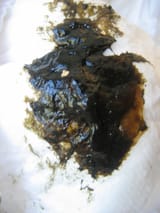Search Results
ID: c8Byh74m/pol/511375563#511389710
7/26/2025, 6:41:33 AM
Enjoy lol
Babies (fetuses) in the uterus do produce urine, but they do not pass solid stool (poop) in the usual sense unless something is wrong.
Here’s how it works:
Urination (Pee)
Starting around the second trimester, the fetus begins to produce urine.
This urine is released into the amniotic fluid, the liquid that surrounds the fetus in the womb.
The fetus also swallows amniotic fluid, so there’s a continuous cycle of swallowing and urinating, which helps develop the digestive and urinary systems.
Defecation (Poop)
The fetal intestines start accumulating a dark greenish-black substance called meconium. It’s made of things like swallowed skin cells, lanugo (fine hair), and digestive secretions.
Normally, meconium is not passed until after birth.
If a baby passes meconium in the uterus, it can be a sign of fetal distress, especially during labor. This is called meconium-stained amniotic fluid, and it can be dangerous if the baby inhales it (leading to meconium aspiration syndrome).
Summary:
Pee: Yes — into the amniotic fluid.
Poop: No — meconium is stored in the bowels until after birth, unless there's a problem.
Let me know if you’d like to know what happens to all that fetal urine or how doctors monitor it.
https://en.wikipedia.org/wiki/Meconium
Babies (fetuses) in the uterus do produce urine, but they do not pass solid stool (poop) in the usual sense unless something is wrong.
Here’s how it works:
Urination (Pee)
Starting around the second trimester, the fetus begins to produce urine.
This urine is released into the amniotic fluid, the liquid that surrounds the fetus in the womb.
The fetus also swallows amniotic fluid, so there’s a continuous cycle of swallowing and urinating, which helps develop the digestive and urinary systems.
Defecation (Poop)
The fetal intestines start accumulating a dark greenish-black substance called meconium. It’s made of things like swallowed skin cells, lanugo (fine hair), and digestive secretions.
Normally, meconium is not passed until after birth.
If a baby passes meconium in the uterus, it can be a sign of fetal distress, especially during labor. This is called meconium-stained amniotic fluid, and it can be dangerous if the baby inhales it (leading to meconium aspiration syndrome).
Summary:
Pee: Yes — into the amniotic fluid.
Poop: No — meconium is stored in the bowels until after birth, unless there's a problem.
Let me know if you’d like to know what happens to all that fetal urine or how doctors monitor it.
https://en.wikipedia.org/wiki/Meconium
Page 1
